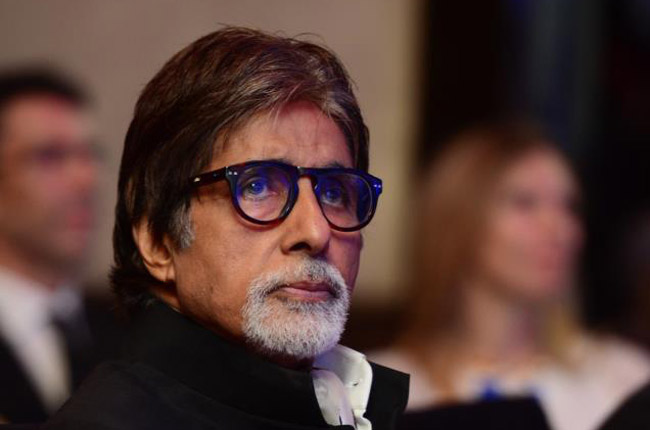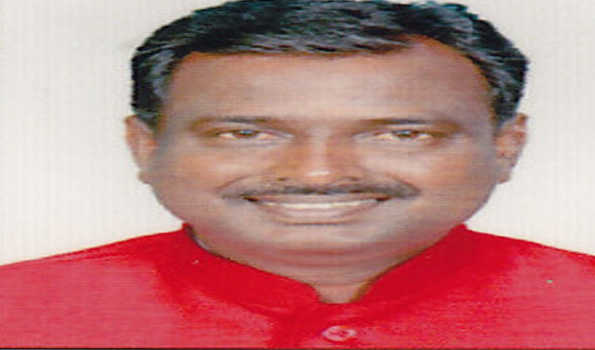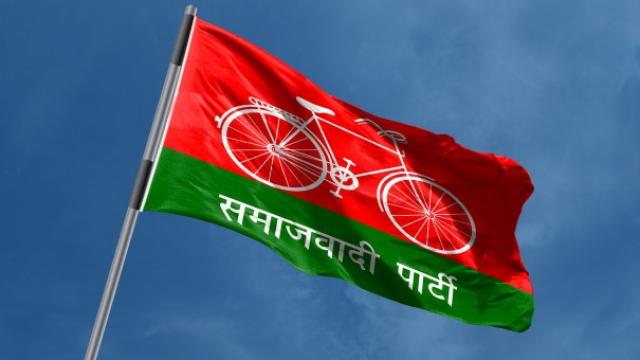अभी भी दलित को हर कुँवें से पानी पीने का अधिकार नही है-सीताराम येचुरी
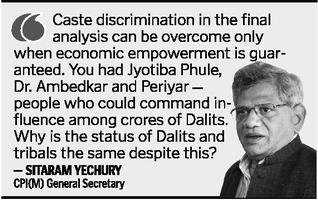
प्रेमचंद की कहानी ‘ठाकुर का कुआँ’ आज भी प्रासंगिक है . 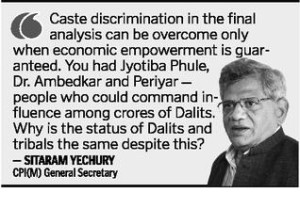 का कहना है कि गाँव के हर कुँवें पर लाल झंडा लहराना इसलिए जरूरी है कि अभी भी दलित को हर कुँवें से पानी पीने का अधिकार नही है. मार्क्सवादी कम्युनिस्ट पार्टी के कोलकाता प्लेनम में जाति-प्रश्न पर केन्द्रीय मुद्दे की तरह विचार किया जा रहा है.The draft resolution calls “economic exploitation” and “social oppression” as “the two feet upon which stands the advance of class struggles in India.”The areas of social oppression identified are gender oppression, and discrimination against Dalits, tribals, the disabled and religious minorities. Mr. Yechury said that a red flag should flutter atop every village well, a reference to the restrictions on Dalits’ rights to draw water from public wells in rural India.
का कहना है कि गाँव के हर कुँवें पर लाल झंडा लहराना इसलिए जरूरी है कि अभी भी दलित को हर कुँवें से पानी पीने का अधिकार नही है. मार्क्सवादी कम्युनिस्ट पार्टी के कोलकाता प्लेनम में जाति-प्रश्न पर केन्द्रीय मुद्दे की तरह विचार किया जा रहा है.The draft resolution calls “economic exploitation” and “social oppression” as “the two feet upon which stands the advance of class struggles in India.”The areas of social oppression identified are gender oppression, and discrimination against Dalits, tribals, the disabled and religious minorities. Mr. Yechury said that a red flag should flutter atop every village well, a reference to the restrictions on Dalits’ rights to draw water from public wells in rural India.
Issues of caste oppression may be addressed by the Communist Party of India (Marxist) as a priority area in future, with its draft resolution introduced by general secretary Sitaram Yechury at the ongoing party Plenum here identifying “social oppression” as a key area.
The draft resolution calls “economic exploitation” and “social oppression” as “the two feet upon which stands the advance of class struggles in India.”
The areas of social oppression identified are gender oppression, and discrimination against Dalits, tribals, the disabled and religious minorities. Mr. Yechury said that a red flag should flutter atop every village well, a reference to the restrictions on Dalits’ rights to draw water from public wells in rural India.
He recalled that in IIT-Madras, a study circle on B.R. Ambedkar had been sought to be prohibited. “In such institutes, where there is no student politics, the CPI(M) has to reach out to students at their residential quarters,” he said, underlining the need to suit traditional left politics to the changing context of professional higher education.
Left parties are believed to have addressed the caste question, which became a defining feature of politics in the last two decades in parts of India, somewhat late in the day.
Mr. Yechury, however, insisted this wasn’t so. However, he sought to underline the specificity of the approach of the left movement – in decline at present – at addressing caste. “Caste discrimination in the final analysis can be overcome only when economic empowerment of the sections is guaranteed,” he said, in answer to a question. “Our stress was more on economic factors and empowerment.”
This comes at a time when caste-based parties have, at least in north India, deprived the Left of a potential base among the poor, who have been mobilised around caste by parties like the BSP.
“Give them land ownership, as we did in West Bengal,” Mr. Yechury said. “You had Jyotiba Phule, Dr. Ambedkar and Periyar – people who could command influence among crores of Dalits. Why is the status of Dalits and tribals the same despite this? Change in heart will not make you equal. Changing the economic empowerment will make you equal.” He pointed to the fact that Dalits represented just four-per cent of Class-I officers in India.
As for the minorities’ question, Mr. Yechury claimed that the RSS was communalising society by “replacing Indian history with Hindu mythology and Indian philosophy with Hindu theology.” He said that the Sangh, “totally devoid of any historians of worth…,” was doing this with state patronage.
फेसबुक पर साहित्यकार वीरेन्द्र यादव की वाल से साभार




